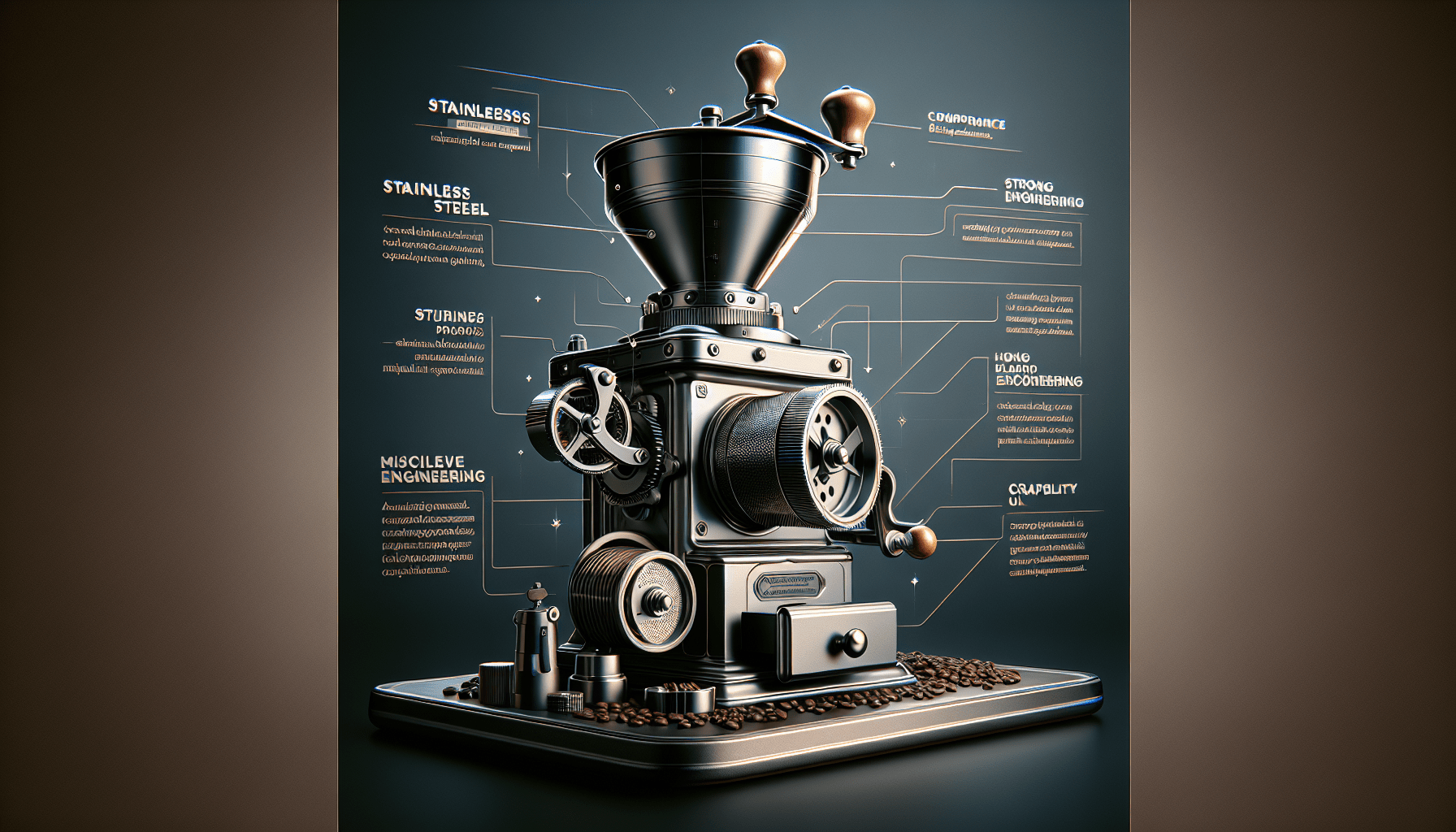If you’re a coffee lover who enjoys grinding beans at home, you may have wondered about the potential health risks associated with using coffee grinder machines. In this article, we’ll explore the topic and shed light on whether or not these machines pose any harm to your health. So, rest assured as we unpack the facts and debunk any concerns you may have.
Contamination
Using coffee grinder machines can potentially lead to contamination in various ways.
Bacterial Growth
Coffee grinders create a warm and moist environment, which is ideal for bacterial growth. If not properly cleaned and maintained, these machines can become a breeding ground for harmful bacteria. When coffee beans are ground, they release oils and residue that can stick to the grinder’s components, providing a fertile ground for bacteria to thrive. If you consume coffee made from a contaminated grinder, you may be at risk of foodborne illnesses and gastrointestinal issues.
Mold and Fungus Growth
Similar to bacterial growth, coffee grinder machines can also harbor mold and fungus. These microorganisms require moisture and organic matter to grow, both of which can be found in the remnants of coffee beans. Breathing in mold or fungus spores can trigger allergic reactions and respiratory problems, especially for individuals with pre-existing conditions like asthma or allergies.
Foreign Object Contamination
Coffee grinders are designed to grind coffee beans into a fine consistency, but they can accidentally grind other foreign objects as well. These objects can range from small pieces of plastic or metal from the grinder itself to particles present in the coffee beans. Ingesting these foreign objects can lead to injuries, such as cuts or abrasions in the mouth or throat, and potentially pose a choking hazard.
Airborne Particles
Using coffee grinder machines can contribute to the circulation of airborne particles, which can have negative health effects.
Dust Inhalation
When coffee beans are ground, they create fine particles that can become airborne and easily inhaled. Inhaling coffee dust may irritate the respiratory system, causing coughing, sneezing, and difficulty breathing. Individuals with respiratory conditions, such as asthma or chronic obstructive pulmonary disease (COPD), are particularly susceptible to the negative effects of dust inhalation.
Respiratory Issues
In addition to coffee dust, coffee grinder machines can contribute to overall indoor air pollution. The fine particles released during the grinding process can mix with other airborne pollutants, such as pet dander, pollen, and dust mites. Prolonged exposure to these pollutants can lead to respiratory issues, including allergies, bronchitis, and exacerbation of existing respiratory conditions.
Noise Pollution
Coffee grinder machines can generate significant levels of noise, which can have both physical and psychological impacts.
Hearing Damage
Exposure to loud noise from coffee grinder machines on a regular basis can potentially cause hearing damage. Prolonged exposure to high noise levels can lead to permanent hearing loss or tinnitus, a condition characterized by a constant ringing or buzzing sound in the ears. To protect your hearing, it is important to limit your exposure to excessive noise and use hearing protection devices if necessary.
Stress and Anxiety
Noise pollution can also have psychological effects, leading to increased stress and anxiety levels. Constant exposure to the loud grinding noise can be irritating and disruptive, making it difficult to concentrate or relax. Creating a peaceful environment is essential for overall well-being, and minimizing noise pollution from appliances like coffee grinders can contribute to a more tranquil space.
Electromagnetic Fields (EMF)
Coffee grinder machines, like many household appliances, emit electromagnetic fields (EMF) that may raise concerns regarding potential health effects.
Potential Health Effects
EMF is a type of non-ionizing radiation, and while some studies suggest possible health risks associated with long-term exposure to high levels of EMF, there is currently no conclusive evidence linking coffee grinder machines to adverse health effects. However, individuals who are particularly sensitive to electromagnetic radiation may choose to limit their exposure by maintaining a safe distance from the machine or turning it off when not in use.
Physical Injuries
Using coffee grinder machines can pose risks of physical injuries if proper precautions are not taken.
Burns
Coffee grinders typically generate heat during operation, particularly in models with built-in grinders. Careless handling or accidental contact with hot components can result in burns. It is important to follow the manufacturer’s instructions, allow the machine to cool before cleaning or maintenance, and avoid touching hot surfaces to prevent burns.
Cuts and Abrasions
Cleaning and maintaining a coffee grinder machine may involve handling sharp components, such as blades or grinder burrs. Without proper caution, it is possible to sustain cuts or abrasions. It is advisable to exercise care when disassembling or cleaning the machine, using appropriate tools and protective equipment to minimize the risk of injury.
Carbon Monoxide (CO) Emission
While coffee grinder machines do not directly emit carbon monoxide (CO), improper use of the machine may indirectly contribute to CO exposure.
Increased Risk of Poisoning
If the coffee grinder is used in an enclosed or poorly ventilated space, the emission of CO from other appliances, such as gas stoves or heaters, can be trapped and potentially pose an increased risk of CO poisoning. It is essential to ensure proper ventilation and maintain a safe operating environment to minimize the risk of CO exposure.
Chemical Exposure
Certain components or materials used in coffee grinder machines may pose potential health risks if exposed to them.
Aluminum
Some coffee grinder machines may contain parts made of aluminum. Prolonged exposure to aluminum has been linked to health concerns, including neurological disorders such as Alzheimer’s disease. However, the amount of aluminum exposure from coffee grinders is typically minimal and unlikely to result in significant health effects.
Bisphenol A (BPA)
Bisphenol A (BPA) is a chemical compound commonly used in the production of certain plastics, including those used in some coffee grinder machines. BPA has raised concerns due to its potential to disrupt hormone function and contribute to various health issues. However, manufacturers have increasingly shifted towards BPA-free materials to mitigate these concerns. It is advisable to choose coffee grinder machines labeled as BPA-free to minimize potential exposure.
Skin Irritants
Coffee grinder machines may come into contact with the skin during operation or maintenance, potentially leading to skin irritations.
Contact Dermatitis
Contact dermatitis is a common skin condition that can result from prolonged or repeated exposure to certain substances. Coffee grounds or cleaning agents used in the maintenance of coffee grinder machines may cause skin irritations or allergic reactions in susceptible individuals. It is important to wear protective gloves when handling these materials and promptly wash any area of skin that comes into contact with them.
Caffeine Intake
Using coffee grinder machines is often associated with caffeine consumption, which can have various health effects.
Negative Health Effects
While moderate caffeine intake is generally considered safe for most individuals, excessive consumption can lead to negative health effects. These effects may include increased heart rate, sleep disturbances, jitteriness, digestive issues, and in some cases, dependency or addiction. It is recommended to be mindful of your caffeine intake and maintain a balanced approach to avoid potential health issues.
Addiction
Caffeine is a stimulant that can lead to dependence and addiction. Regular and excessive consumption of caffeine can result in tolerance, causing individuals to require higher doses to achieve the same effects. This dependency can lead to withdrawal symptoms, such as headaches and irritability, when caffeine intake is reduced or discontinued. It is important to be aware of your caffeine consumption and consider moderation to avoid potential addiction.
Occupational Hazards
For individuals working with coffee grinder machines in a professional setting, there are specific occupational hazards to be mindful of.
Workplace Safety Risks
Professionals in coffee shops or other foodservice establishments may operate coffee grinder machines on a daily basis. It is crucial to follow proper safety protocols and guidelines when using these machines to minimize the risk of injuries or accidents. Regular training, wearing appropriate protective gear, and adhering to occupational health and safety regulations are essential to ensure workplace safety.



